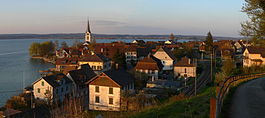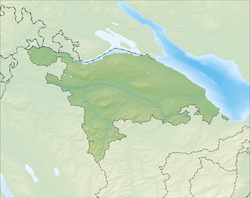Berlingen TG
| Berlingen | ||
|---|---|---|
 |
||
|
||
| Coordinates: 47°40′N 9°1′E / 47.667°N 9.017°ECoordinates: 47°40′N 9°1′E / 47.667°N 9.017°E | ||
| Country | Switzerland | |
| Canton | Thurgau | |
| District | Frauenfeld | |
| Government | ||
| • Mayor | Heinz Kasper | |
| Area | ||
| • Total | 3.56 km2 (1.37 sq mi) | |
| Elevation | 400 m (1,300 ft) | |
| Population (Dec 2016) | ||
| • Total | 884 | |
| • Density | 250/km2 (640/sq mi) | |
| Postal code | 8267 | |
| SFOS number | 4801 | |
| Surrounded by | Gaienhofen (DE-BW), Raperswilen, Reichenau (DE-BW), Salenstein, Steckborn | |
| Website |
www SFSO statistics |
|
Berlingen is a municipality in Frauenfeld District in the canton of Thurgau in Switzerland.
It is located on the Untersee, the west tip of Lake Constance.
Berlingen is first mentioned in 894 as Berenwanc. In 1267 it was mentioned as Bernanch and until the 18th Century it was known as Bernang.
Berlingen has an area, as of 2009[update], of 3.56 square kilometers (1.37 sq mi). Of this area, 1.07 km2 (0.41 sq mi) or 30.1% is used for agricultural purposes, while 2.07 km2 (0.80 sq mi) or 58.1% is forested. Of the rest of the land, 0.4 km2 (0.15 sq mi) or 11.2% is settled (buildings or roads) and 0.01 km2 (2.5 acres) or 0.3% is unproductive land.
Of the built up area, industrial buildings made up 6.7% of the total area while housing and buildings made up 0.0% and transportation infrastructure made up 0.6%. while parks, green belts and sports fields made up 3.9%. Out of the forested land, 57.0% of the total land area is heavily forested and 1.1% is covered with orchards or small clusters of trees. Of the agricultural land, 24.7% is used for growing crops, while 5.3% is used for orchards or vine crops.
The municipality is located in Frauenfeld District, on a river delta in the Untersee region of Lake Constance. It consists of the village of Berlingen.
Berlingen has a population (as of December 2016[update]) of 884 As of 2008[update], 21.2% of the population are foreign nationals. Over the last 10 years (1997–2007) the population has changed at a rate of 1.4%. Most of the population (as of 2000[update]) speaks German(94.5%), with Italian being second most common ( 1.6%) and Albanian being third ( 0.8%).
...
Wikipedia




